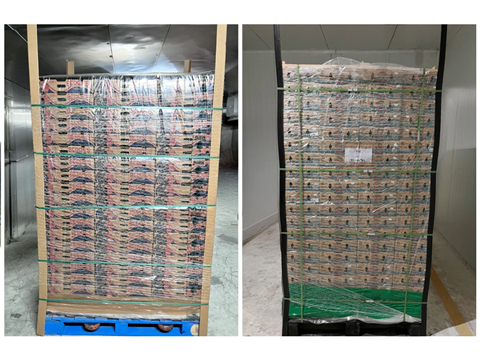
StePacPPC’s polyamide-based, modified atmosphere, humidity-infused protective covers are designed to protect fresh berries in transit and storage while keeping plastic consumption at a minimum.
Designed for fresh produce stacked on a pallet for shipment at temperatures near 0°C, the Xtend Pallet Shrouds are recommended for use with delicate, low-respiration berries such as blueberries, raspberries, strawberries, and blackberries.
The covers are made from an advanced polyamide-based film, said to offer ‘moderate to high’ water vapour transmission rates and prevent moisture accumulation. This addresses a common problem with conventional solutions, since the small surface-area-to-volume ratio of a pallet shroud can trap excess moisture, driving both microbial decay and carton collapse.
StePacPPC intends for its Xtend Pallet Shrouds to support applications where its existing bulk carton liners aren’t practical. For example, field-packed produce can pose challenges, since berries must be at least partially cooled before being packaged in Xtend bulk bags.
In response, the new covers have integrated advanced modified atmosphere and modified humidity technology. This is hoped to keep the berries fresh and high-quality as they are transported and stored over longer periods of time, even in fluctuating or poorly managed conditions.
“We can tailor the pallet shrouds to meet the unique preservation needs of a variety of fruits and vegetables,” says Gary Ward, Ph.D., CTO for StePacPPC. “For produce items that do not benefit from modified atmosphere, we provide a variant that relies solely on modified humidity to reduce weight loss.
“It is also critical to understand for which produce items the use of pallet shrouds represents a risk due to the potential for ethylene accumulation, temperature increase or both. This is where our know-how and deep understanding of fresh produce and cold-chain logistics help us support our customers with the most effective packaging solution possible for their specific needs.”
“Blueberries are extremely delicate fruits and highly sensitive to handling, temperature changes, and moisture and typically have a very short shelf life,” continues Felipe Martinez Casas, CEO of Cima Berries Mexico – a company currently utilizing the pallet shrouds to ship berries across Central and North America.
“The MAP properties of Xtend pallet shrouds helped us reduce weight loss and preserve the quality of our organic Blueberries that we send by truck from Mexico to Guatemala. Once the shroud is removed, the berries are still firm and maintain their vibrant blue colour for display.”
Keeping products fresh during short-to-medium-term storage is set to level peaks and troughs in supply and benefit inventory management. Growers and packers in Poland and Argentina are cited as StePacPPC suggests that blueberries can be stored for three to four weeks in various global climates.
Other reported benefits include the prevention of dehydration and the ability to remove the shroud for fumigation if cold sterilization processes fail. The shroud is also said to keep the amount of plastic per unit weight of produce at ‘an absolute minimum’.
Additionally, a standard reefer container with an Xtend pallet shroud is set to be a cheaper alternative to controlled atmosphere containers, thus offering customers a financial advantage.
“Our pallet shrouds are proving to be instrumental in optimizing inventory management and ensuring consistent market supply of high-quality berries over a prolonged period,” Ward concludes. “Not only do they improve the experience of the customers who receive punnets of berries at close-to-harvest freshness, they help reduce waste and plastic use.”
Earlier this year, 2nd Level Global Solutions sought to overcome plastic waste in the logistics sector with its 100% paper-based, completely recyclable, and water-resistant thermal pallet covers. Engineered from an ‘advanced fusion of paper’, the range is designed to protect palletized goods against temperature fluctuations in transit, as well as resist both water damage and tearing.
Since then, Hydropac has debuted thermal pocket packs made from sheep wool. Engineered for temperature-sensitive sectors like perishable food delivery, the new packs can apparently maintain thermal integrity for up to 24–48 hours and prevent the condensation buildup common in some synthetic alternatives.
If you liked this story, you might also enjoy:
The ultimate guide to the Packaging and Packaging Waste Regulation in 2025
How are the top brands progressing on packaging sustainability?
Everything you need to know about global packaging sustainability regulation in 2025
The key to increasing the use of reusable packaging in supermarkets














No comments yet